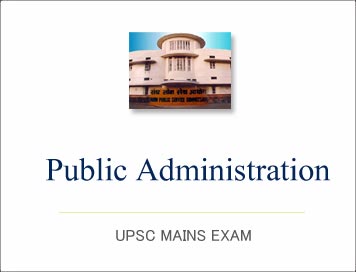(Download) UPSC IAS Mains 2012: Public Administration (Paper -1) Optional Question Paper
(Download) UPSC IAS Mains 2012: Public Administration (Paper -1) Optional Question Paper
Subject: Public Administration
Exam Date: 9th October 2012
Paper: I
File Size: 822 KB
File Type: PDF
Paper- I
:: Section A ::
Q.1. Answer the following question in not more than 150 words each:- 12 ×
5 = 60
(a) ‘On a more sophisticated plane public choice is concerned with “Pareto
optimality”, or at least with “Pareto improvements”.’ Comment.
(b) ‘In the canonization of this abstract idea of ‘Staatstraison’ are
inseparably woven the sure instincts of the bureaucracy for the conditions which
preserve its own power in the State’ [Weber]. Explain.
(c) ‘Man’s motives ….. in different subparts of the same organizations may be
different’ [Edgar Schein]. Discuss.
(d) Leadership is the ‘influential increment over and above mechanical
compliance with the routine directive of the organization’ [Katz and Kahn].
(e) ‘Policy judgements comprise reality judgements, value judgement and
instrumental judgments’ [Geoffrey Vickers]. Elucidate.
Q. 2.
(a) How would you trace the development of Public Administration in items of
different paradigms from the politics/administration dichotomy of 1900 – 1926 to
the rise of Public Administration of Public Administration after the formation
of the National Association of Schools of Public Affairs and Administration (NASPAA)
in the USA in 1970? 30
(b) (i) In what respects is Taylor’s ‘Scientific Management’ or classical
motivational theory different from the classical organizational theory expounded
by Gulick, Urwick etc? 15
(ii) What light does Antonio Gramsci’s critique of Taylorism throw on its
socio-psychological underpinnings? 15
Q. 3.
(a) ‘Three features characterize Simon’s original view of bounded
rationality: search or alternatives, satisfying, and aspiration adaptation,’
Elucidate. 20
(b) (i) ‘The essence of the contingency theory paradigm is that organization
effectiveness results from fitting characteristics of the organization, such as
its structure, to contingencies that reflect the situation of the organization.’
Give your reactions to this statement. 20
(ii) In the light of your discussion on 3(b) (i) above, also show where and how this ‘fitting’ differs essentially from the ‘coping’ with ‘stress’ from the environment emphasized by the systems theory of organization. 20
Q. 4.
(a) ‘Open access to government records is … the hallmark of a
democratic government’, but ‘governments are not hesitant about destroying
record — very deliberately — in order to prevent investigations, as well
as to generally weaken accountability’. Do you think that in this situation
right to information can go to the extent of demanding complete declassification
and ‘de-archivization’ of government records? Argue. 30
(b) Should media exposure be included in rules for administrative accountability
in India? State your views. 15
(c) Comment on the role of Civil Society in facilitating administrative
accountability with special reference to the ‘Janlokpal’ issue in India. 15
:: Section ‘B’ ::
Q.5. Answer the following question in not more than 150 words each— 12 × 5
= 60
(a) ‘Riggs’s classifications of societies into fused, prismatic, and
diffracted is built around the concept of differentiation.’ Analyze.
(b) ‘The anti-development thesis …. Reduces development to an idea without
history, impervious to change’, but ‘fails to take account of the fact that for
all its faults, development can be empowering.’ Discuss.
(c) The ‘selection model of recruitment rests on the assumption that the primary
needs to be met are those the organization.’ Examine
(d) ‘Our normal expectation should be that new programs will fail get off the
ground and that, at best, they will take considerable time to get started. The
cards in this world are stacked against things happening’ (Pressman and
Wildavsky). Comment.
(e) ‘Those who budget, deal with their overwhelming burdens by adopting
heuristic acids to calculation’ (Wildavsky). Explain.
Q.6.
(a) Do you think that there is an unresolved and often overlooked tension in
Dicey’s concept of rule of law, considering that the other principle of
parliamentary sovereignty in English constitutional system runs counter to it?
20
(b) Would you agree that the strong Rechsstaal version of the rule of law found
on the Continent never existed in England because of the its particular history?
20
(c) Why is le droit administrative regarded alongside the Napoleonic Code as the
most notable achievement of French legal science? 20
Q.7.
(a) Comment on the reason why universal theory remains elusive in comparative
public administration. 20
(b) Given the importance of the issue of sex equality in development do you
think the self-help group movement adequately addresses absence of women in the
former mainstream development agenda?
(c) Would you agree with Bachrach and Baratz that along with decisions,
non-decision are also part of policy? Give reasons for your answer. 20
Q.8.
(a) (i) ‘Relations are the building blocks of network analysis’ — In the
light of this statement summarize the form and content of relations in ‘network
analysis’. 15
(ii) Trace the background and development of PERT and enumerate the steps
involved in the application of PERT. 15
(iii) Draw a simple PERT chart for a seminar planning project. 15
(b) ‘The apparent demise of e-Government and e-Business as the main organizing principle of society has created the conditions for the rise of e-Governance from the ashes’ — In the context of the above statement show the distinctions between e-Government and e-Governance. 15


